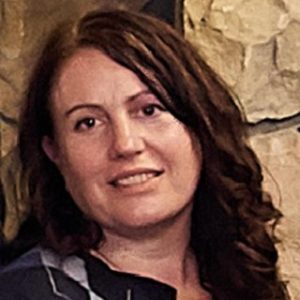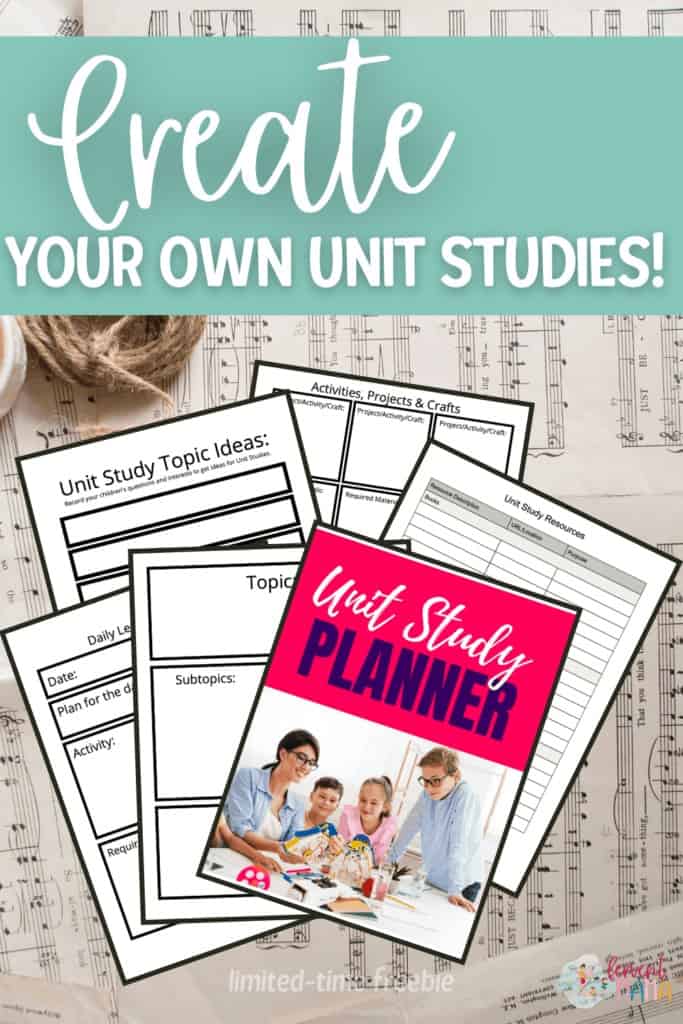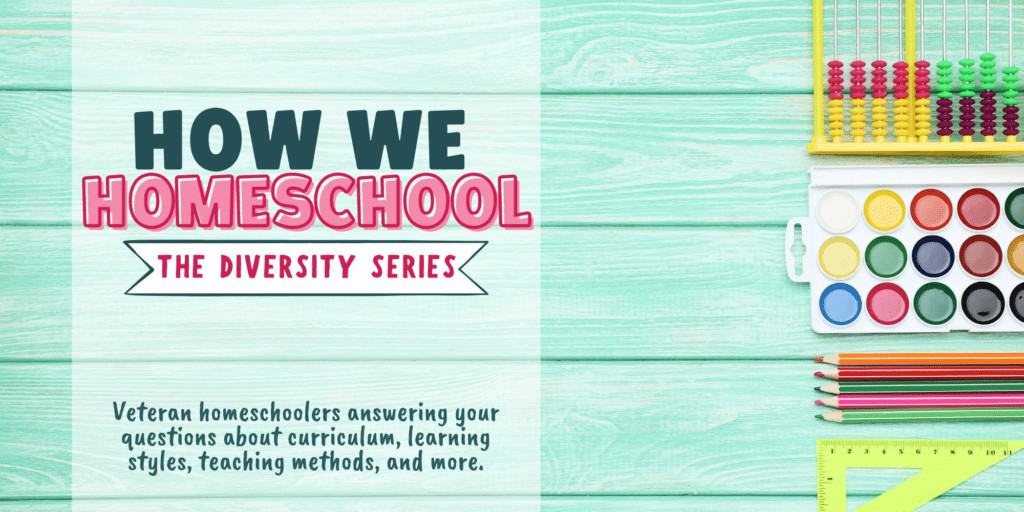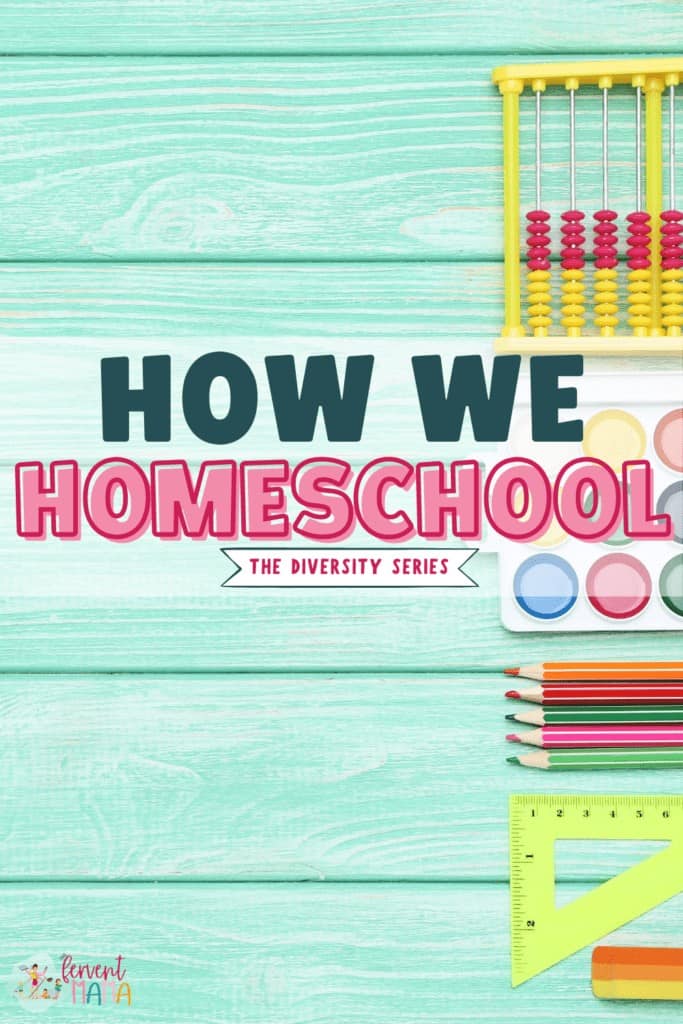Homeschooling Multiple Ages with Unit Studies
The Fervent Mama uses Affiliate Links. See our disclosure policy here.
As a homeschooling mom to eight kiddos spread out over 14 years, one thing I learned early on was how to homeschool multiple ages at the same time. It was a matter of sanity!
You know how it is. You’re responsible for nutritious meals, clean laundry, sparkling toilets, chauffeuring your kiddos to all of their extracurricular activities…. Who has an extra 10 hours a day to spend on homeschooling?
And that’s how long it would take if you had to homeschool the first grader and the third-grader and the fifth-grader and the seventh-grader and the ninth-grader and the eleventh-grader all separately.
What would you think if I told you could spend well under 3 hours a day on homeschool (most days under two hours) and yet impart an outstanding, personalized, individualized education — to each of your many children?
Homeschooling multiple ages with unit studies is a great way to work smarter, not harder.
Get your own Unit Study Planner Here!
Homeschooling Multiple Ages with Unit Studies

What Is A Unit Study?
Unit Studies are popular with homeschoolers because they provide a hands-on, cross-curricular, real-life approach to learning. They are a great way to immerse the entire family — all ages and interests — in deep, immersive learning.
Unit studies integrate various subjects; math, science, language arts, history, geography, and the arts, into one central topic. You learn about that topic in an interesting and engaging way that will captivate your kids and make them want to learn more.
Curious children view the world as a whole, not in the segmented pieces (geography, history, geology, biology, etc…) in which educators tend to present information. Unit Studies are incredible tools for capturing and holding a child’s attention!
Amanda Bennett defines Unit Studies as:
“. . . an in-depth examination of a topic (space, trees, cars, etc.) that approaches the topic from many academic disciplines—geography, science, history, art, etc. It is a complete immersion into the topic so that the student will see things as a “whole” instead of as disjointed bits and pieces learned throughout his education.”
Learn more about the Unit Studies approach to homeschooling
How do Unit Studies work?
A good unit study involves learning about a topic in an interesting and engaging, cross-curricular way that will captivate the imagination and make children want to learn more and continue to think about the things they are learning.
For example, a couple of years ago my son was really into trains. We spent about two weeks studying the history of trains, including the transcontinental railroad and how immigrant workers built it. We talked about train tracks and trestle bridges, and then we built our own using toothpicks.
We discussed the development of the steam engine, coal-powered, gasoline, and then electric trains and we learned about the inventors of the processes. We talked about the physics and chemistry behind the processes and we built a steam engine from a kit.
We took a field trip to the Golden Spike National Historic Park. We learned about the different types of train cars and their uses. We read some train-themed literature and not too long after finishing our train study we visited China, where we road all kinds of trains cross-country.
History, science, technology, engineering, geography, writing, art, and literature were all heavily involved in this unit study, plus it was fun and helped to instill a love of learning!
You can take pretty much any topic and investigate it thoroughly from all angles as a unit study. The best part is that each child learns on his own level. My 4-year-old learned as much about trains on her own level as my 14-year-old did on his level.
You don’t have to differentiate the teaching, either. You just teach the principles and your kids will meet you on their own levels. In fact, the questions the little kids ask deepen the understanding of the older kids as they all work together to find answers.
How I Homeschool Multiple Ages with Unit Studies

In our homeschool, the only subject that we don’t include in Unit Studies is math. In my opinion, math has to be studied daily and all of my kids are on very different levels, so I just leave it out of Unit Studies unless there is a very natural fit and it’s a concept that all of my kids understand (or one that is easy to explain quickly to the littles).
Actually, my children learn fractions at about the same time they learn to add and subtract, just because we have a fun Thanksgiving-themed fraction game as part of a Thanksgiving Unit Study that I pull out every year. However, we typically study math outside of our unit studies.
All other subjects can be incorporated easily and beautifully into Unit Studies.
Here’s what we do in a nutshell:
- We start each homeschool day (around 9 am) around the kitchen table. I like to start with ‘Morning Time’, which is something high interest, like a read-aloud, a math game, or something that will bring my kids running to the table cheerfully so I don’t have to drag them by their hair, lol!
- Immediately following morning time, which takes about twenty minutes, my kids study their math independently. Each lesson in the textbook (we use Saxon) starts with instruction and is followed up by a problem set.
- My kids complete the daily problem set, then we check their answers together and make corrections. I’m also available for questions while they work on their problem sets.
- Because we all work on math together around the kitchen table, we can finish it in about an hour.
- Math is the only subject required daily. My kids have other responsibilities, too, like practicing their instruments and classes that they’ve chosen to take (coding, foreign language, speech & debate, orchestra).
But those are usually classes where my children are responsible to an outside teacher rather than myself. My kids complete assigned work for those classes and their practicing following math.
Plus my kids read voraciously. I have to hunt them out of the nooks and crannies of our house constantly to get them to complete chores and other things. And I sneak excellent literature and nonfiction into their library bags, so at least part of their reading is educational.
One or two days a week (on average) we work on Unit Studies after Math, which is how we accomplish the rest of the subjects: science, history, tech, writing, etc…
When I say once or twice a week, what I mean is that we’ll generally complete two unit studies a month, but we don’t really space them out over a couple of weeks. My kids get too excited!
Instead, they dive in deep and work for three days straight before coming up for air. So they’ll complete the unit study in three days, and then we have a long break where we only complete math. When we’re ready, we’ll take another deep dive into another unit study.
This routine feels more manageable to me because most days we only spend about an hour on school (my kids do spend a bit longer, but my presence is not required). I can handle a couple of long days each month to work through Unit Studies, especially because it’s so enjoyable.
We have encountered Unit Studies before that were not enjoyable and we just set them aside and move onto Unit Studies that are more interesting. It’s your prerogative as a homeschooler to make your homeschool work for you!
Oh, and in case you’re thinking that the amount of time we spend on homeschooling is insufficient, I’ll just tell you that I worried a little, too. But it was all I could manage with a big family. Still, I worried.
I worried until my oldest earned a near-perfect ACT score and completed an associate’s degree during high school with a near-perfect GPA. She finished university on full scholarships and is in grad school.
I still worried a teensy bit (she could have been a fluke) until the results were the same with my second child and then my third. Both are currently attending university on full scholarships.
I feel pretty confident now that I’m not shortchanging my children at all by spending so little time on school or by studying Unit Studies together as a family rather than having each child complete separate, grade-level curriculum.
Unit Studies work!
Different Types of Unit Studies
Unit studies come in so many shapes and sizes that I would say the only thing a unit study is NOT is a single-subject curriculum intended to be completed in small increments over a semester or a year.
No matter how you do it, or what type you choose, homeschooling multiple ages with unit studies is a blessing and you should feel encouraged to school your kiddos together with this method!
Literature-Based Unit Studies
At our house, we often just call these storytimes. I basically choose a couple of fun activities to go along with a book (both picture books and novels).
For example, we read The Hiding Place, then watched the movie, learned about The Netherlands, did some map work and copy work from book quotes, enjoyed some Dutch chocolate and fun activities that went along with each chapter. Here are a few of our Story Time activities and free printables.
Topical Unit Study
Like the train unit study mentioned above, these usually stem from one of my children’s interests or questions. We’ve studied light, lenses, electricity, electric vehicles, the phases of the moon, the solar system, life cycle of plants, plant and animal classifications, weather, the water cycle, elephants, penguins, apes and so many more.
Nature Studies
I always think of Thomas Jefferson and Charlotte Mason when we head out into nature to explore and discover. We draw from nature, label and classify. My kids particularly enjoy rockhounding, then polishing and classifying their finds.
Subject Studies
You can study any subject in a Unit Study style by asking questions and answering them using the Scientific Method.
Country Studies
We always complete these before traveling to a new place. These usually consist of the history and geography of a country, as well as its culture, traditional music and art, predominant religions, and ethnic foods. My kiddos particularly like to study the animals indigenous to different countries.
Holiday Studies
It’s a lot of fun to study the origin of different holidays, along with ways they are celebrated around the world. We like to check out lots of books about each holiday and discover fun facts to share with one another. We usually make a traditional treat to go along with our holiday studies and they also frequently involve music.
Human Studies
Think of people who exemplify the virtues you want to instill in your children, or inventors, artists, musicians, politicians, or scientists who have changed the world. You can create a Unit Study around that person and discuss the history and geography of his life and his contributions. You can learn about the contributions themselves and incorporate writing and any other subjects you desire.
Get your ownUnit Study Planner for FREE for a limited time! Now, you can confidently make every moment a learning moment!
CLICK HERE TO DOWNLOAD YOUR FREE UNIT STUDY!
Are you homeschooling a slew of kiddos? Why not try homeschooling multiple ages with unit studies?
This post was written by….

Amy blogs at Orison Orchards (named after the farm/orchards the Saunders family owns) where she helps homeschooling mama’s find the confidence to educate their children using a child-led approach, and live life to the fullest without breaking the bank. She has homeschooled all eight of her children exclusively. Her oldest three are attending their universities of choice (on full scholarships) and her youngest is 6-years old. Amy advocates sunshine, pinches pennies, and is the Chief Idea Officer of the Saunders family.
This article is a part of our How We Homeschool Series; a collection of content from full-time, veteran homeschoolers sharing their own experiences on the versatility and diversity of homeschooling. You can read more about the series, and see all of the content, by clicking the image below.












